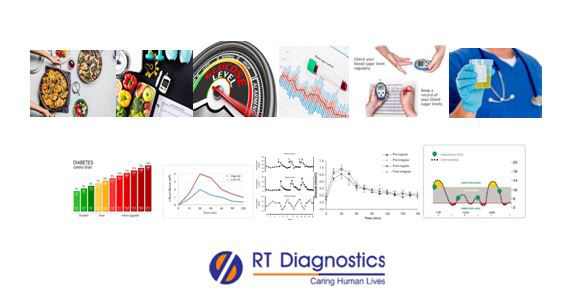Sugar After Dinner:
Why Sugar After Dinner Test ?
CLINICAL INFORMATION
Glucose is the primary energy source of body’s cells (including brain) and hence relatively constant level of glucose must be maintained in the blood. Normally after a meal, blood glucose raises and so the hormone insulin (secreted from the pancreas), helps transport glucose into body’s cells where it is used as a source of energy (ATP produced by glycolysis and Kreb’s cycle). Diabetes is a disease resulting from an imbalance between glucose and insulin. Type-1 diabetes results when body is not able to produce insulin to control blood glucose levels (auto-antibodies that destroy the beta cells of pancreas) and type-2 diabetes results from a combination of insulin resistance (reduced sensitivity of insulin against blood glucose compared to normal person’s response) and relative decline in insulin production. Other types of diabetes includes gestational diabetes (the condition restores back to normal after pregnancy period), juvenile diabetes etc. Test result of glucose tolerance test is represented as a blood glucose chart shows a person’s blood sugar levels – including before (fasting) and after meals (post-prandial). Causes of diabetes are family history, obesity, high blood pressure, sedentary life style, junk foods, old age etc. Signs and symptoms or clinical manifestations of diabetes mellitus are hyperglycemia, polyuria, polydipsia and polyphagia etc. Complications of untreated diabetes include morbidity and mortality rate (life expectancy), risk factor for cardiovascular diseases, metabolic syndrome, obesity, poly cystic ovarian disease (PCOD), damages in the thin and fine small arteries such as in the eyes, end organ damages eg. eyes, kidneys, blood vessels, brain and heart, stress, foot problems and other illnesses etc. Pre and post-prandial testingis also called as “Pairs” of before and after meal tests that evaluates the sugar levels (the range of spike) between meals (before and after meal). Thus the test value reveals the amount of calories (nutritive value) released in terms of blood glucose (instant in cases with carbohydrate rich diet) and also reveals the effect of medications (oral hypoglycemic medications or insulin shots) that modulate the blood glucose effectively. In diabetic patients (in type-1 or type-2 diabetes), the blood glucose levels peak around 2 hours after the meal, and the measurement of blood glucose levels after a meal is called a post-prandial blood glucose test. If the blood glucose levels elevate to a higher level constantly, the likelihood of developing complications is high. Thus it is also important to become aware of the meal choices and hence re-evaluation of diet becomes necessary. Post-dinner sugar (glucose) test: Post-prandial Blood glucose results may differ in patients with type-1 and type-2 diabetes. Usually, after 2 hours of consuming a meal, the blood glucose levels tend to peak. Hence postprandial test helps to check if the diabetic patient’s blood glucose is within a well-controlled range during prognosis. Post-meal test or sugar (glucose) after dinner test results are helpful in the monitoring of medications (prognosis) i.e if the right therapeutic dose of oral hypoglycemic drugs or exogenous insulin had been taken and also its effectiveness as to how the body responds to it (especially in Type-2 diabetes where the fluctuation of blood glucose is high and hence the monitoring is important)after (dinner) meal. If the post-meal test or post-dinner test results are high then it reveals the effectiveness of exogenous insulin injected into the body (either the dose is less or the body is developing resistance to the drug). Hence the dose of the medicine and/or an effective medication needs to be prescribed to avoid further complications. Moreover, the test result also indicates if the diet consumed was a carbohydrate-rich diet. False-positive test results can arise in smokers, who consume coffee (caffeine-based products) and patients on certain medications like corticosteroids, diuretics (water pills), anti-depressants etc. Additional tests include Hb-A1c to monitor prognosis in patient’s compliance during diabetes treatment. Other tests include a C-peptide test (for patients with exogenous insulin shots), glucagon test etc. Other tests include cortisol tests etc.

General Instructions:
Sample Requirement: Specimen - Blood sample collected from the vein. Test Preparation: None.
NOTE - Sample for specimen collections may vary based on the patient’s condition/cases according to the patient’s presenting complaints/signs or symptoms:
SPECIMEN REQUIREMENT (Special or Rare Cases) - As instructed and guided by Physician / Clinician / Pathologist / as per Laboratory’s requirements, according to procedures and protocols.
This Multi-Specialty Clinical Referral Laboratory RT DIAGNOSTICS provides precise and accurate tests with an extensive range of testing services to the medical centres to help in the diagnosis and identification of pathology in the test specimens for infectious diseases and also to evaluate the function of organ systems of the patient. It prevents further complications and helps to stabilize and restore health to near normalcy at the earliest without delay.



